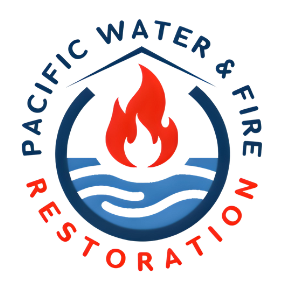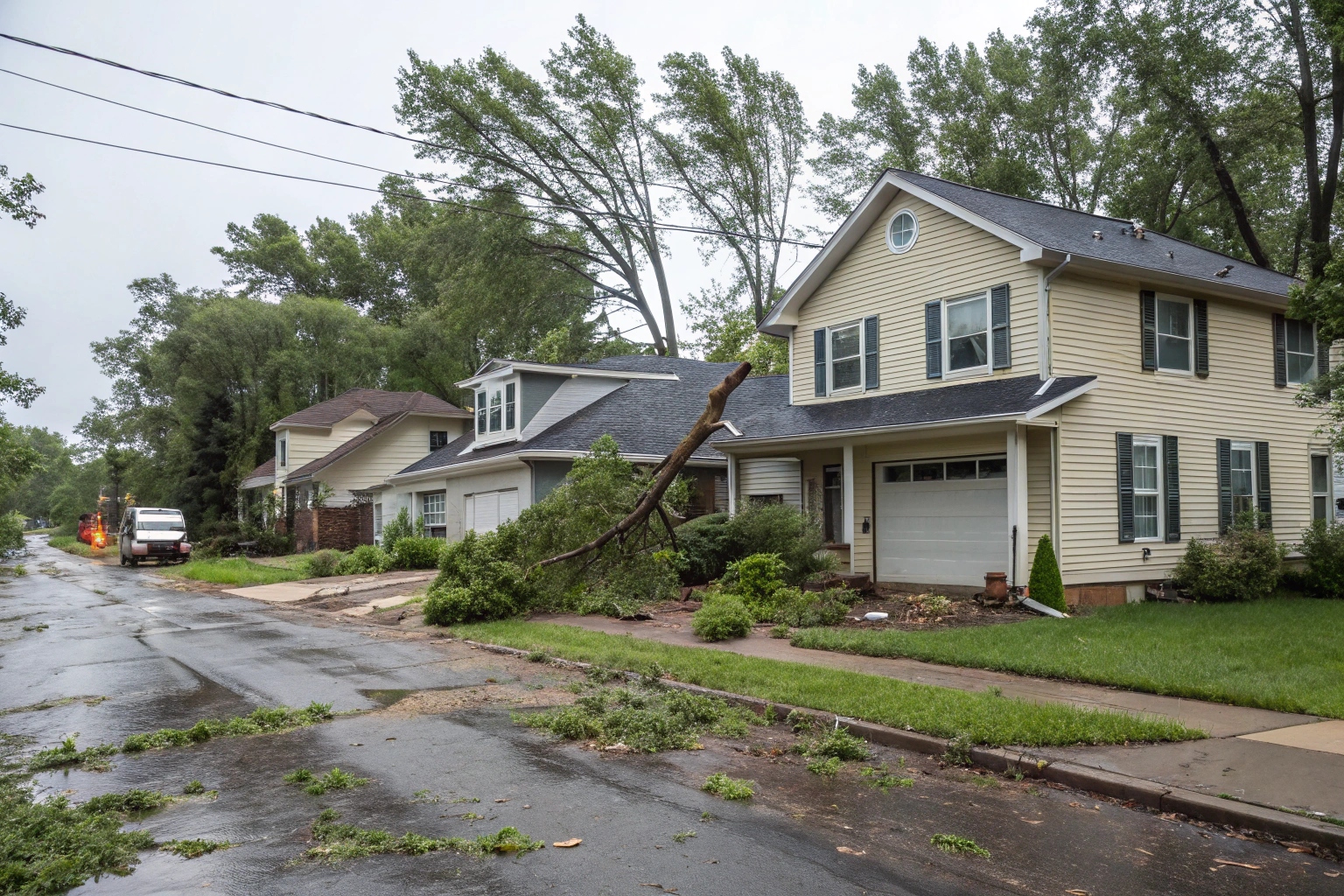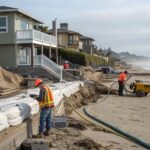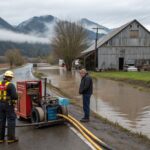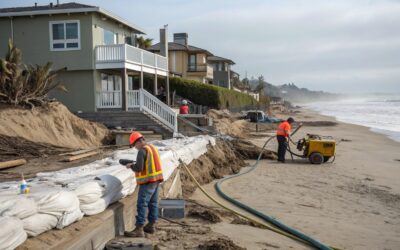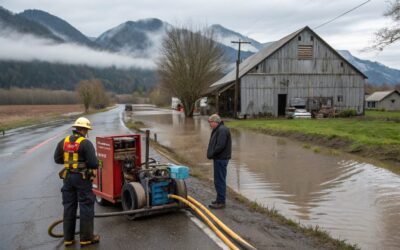For Monmouth residents, the beautiful landscapes of Oregon’s Willamette Valley come with seasonal weather challenges that can threaten homes and safety. From powerful winter storms to occasional severe wind events, being prepared isn’t just advisable—it’s essential. At Pacific Water & Fire Restoration, we’ve helped countless property owners throughout the Portland metro area recover from storm damage, and we’ve learned that preparation makes a significant difference in minimizing loss and ensuring family safety.
Understanding Monmouth’s Weather Patterns and Risks
Monmouth’s location in the Willamette Valley creates a unique set of weather-related challenges that residents should understand to better prepare their properties.
Seasonal Weather Risks in Monmouth
Winter Storm Patterns:
- Atmospheric Rivers: The Pacific Northwest frequently experiences these concentrated moisture bands that can bring intense rainfall
- Ice Storms: Monmouth’s elevation and inland location make it susceptible to freezing rain events
- Cold Snaps: Periodic Arctic air intrusions can cause pipe freezing issues
- High Winds: Particularly during winter systems moving through the Willamette Valley
Historical Context: The December 2008 winter storm that affected much of western Oregon brought significant snow, ice, and wind to Monmouth, causing widespread power outages and property damage. More recently, the February 2021 ice storm left many Monmouth residents without power for days.
According to the National Weather Service, the Willamette Valley averages 1-2 significant winter storm events annually that can impact Monmouth residents. These events often combine multiple hazards—heavy precipitation, freezing temperatures, and strong winds—compounding their potential impact.
Before the Storm: Essential Preparation Steps
Taking proactive measures before severe weather strikes can significantly reduce potential damage to your Monmouth home and ensure family safety.
Home Exterior Preparation
Roof and Gutters:
- Inspect roof for loose or damaged shingles
- Clear gutters and downspouts of debris
- Ensure downspouts direct water away from your foundation
- Trim tree branches that overhang your roof
Windows and Doors:
- Check weatherstripping and caulking around windows and doors
- Consider installing storm shutters for extreme wind events
- Have materials ready to secure outdoor furniture and decorations
Drainage Systems:
- Ensure proper grading away from your foundation
- Clear any drainage ditches on your property
- Consider installing a sump pump if you have basement flooding issues
Pro Tip: Many Monmouth homes, especially those built before 1990, may have aging roofing systems more vulnerable to storm damage. Consider a professional roof inspection before storm season if your roof is over 15 years old.
Winterizing Your Plumbing
Freezing temperatures in Monmouth can lead to burst pipes and significant water damage:
- Insulate exposed pipes, especially in crawl spaces and attics
- Know the location of your main water shut-off valve
- During extreme cold, allow faucets to drip and open cabinet doors to allow warmer air to circulate
- Consider installing pipe heating cables for vulnerable areas
- Disconnect and drain outdoor hoses and shut off outdoor water supplies
Local Context: Monmouth’s water utility recommends maintaining a minimum indoor temperature of 55°F during freezing weather, even when away from home, to prevent pipe freezing.
Emergency Power Planning
Power outages are common during Monmouth storms, with some areas experiencing extended outages during major events:
- Generator Safety: If using a backup generator, ensure proper installation and ventilation
- Alternate Heating: Have safe backup heating options that don’t require electricity
- Surge Protection: Install surge protectors to prevent electrical damage when power returns
- Battery Backup: Consider battery backup systems for critical medical equipment or sump pumps
Safety Warning: Never use gas stoves, charcoal grills, or camping stoves indoors for heating or cooking during power outages. These can produce deadly carbon monoxide.
Creating an Emergency Kit
Prepare a comprehensive emergency kit that includes:
- Water: One gallon per person per day for at least three days
- Non-perishable food: Minimum three-day supply
- Battery-powered or hand-crank radio
- Flashlights and extra batteries
- First aid supplies
- Medications: At least a week’s supply of prescription medications
- Personal hygiene items
- Cell phone chargers: Including portable power banks
- Emergency contact information
- Cash: ATMs and credit card systems may be unavailable during extended outages
Pro Tip: Western Oregon University in Monmouth often serves as an emergency warming shelter during extended power outages. Add their emergency information line to your contacts: (503) 838-8026.
During the Storm: Safety Protocols
When severe weather strikes Monmouth, following these guidelines can help ensure your safety.
Wind Safety Measures
During high winds:
- Stay away from windows and exterior walls
- Move to a small, interior room on the lowest floor
- Avoid using electrical equipment
- Be aware of the potential for falling trees, especially Monmouth’s mature oak and fir trees
- If outdoors, stay away from power lines, trees, and structures that could collapse
Flooding Precautions
Monmouth’s proximity to Ash Creek and other drainage ways can create localized flooding during heavy rain events:
- Move valuable items to higher levels of your home
- Avoid walking or driving through floodwaters
- Be prepared to turn off utilities if water threatens electrical systems
- Monitor Polk County emergency alerts for flash flood warnings
- Know evacuation routes from your neighborhood to higher ground
Local Resource: The Monmouth Public Works Department can provide sandbags during flood events. Contact them at (503) 838-2173 for information during severe weather.
Power Outage Management
When the power goes out:
- Report outages to your utility provider
- Use flashlights instead of candles when possible
- Keep refrigerators and freezers closed to maintain temperature
- Unplug sensitive electronics to protect from power surges when service resumes
- Check on elderly neighbors or those with medical needs
After the Storm: Damage Assessment and Recovery
Once the storm passes, careful assessment and prompt action can prevent additional damage to your Monmouth property.
Safety First: Initial Property Assessment
Before beginning cleanup:
- Check for structural damage that could make your home unsafe
- Look for downed power lines and report them immediately
- Be alert for gas leaks (if you smell gas, leave immediately and call from a safe location)
- Document damage with photos and videos before cleanup
- Wear appropriate protective gear during inspection and cleanup
Safety Warning: After major storms, damaged trees may be unstable. Monmouth’s older neighborhoods feature many mature trees that can pose significant hazards if damaged. Consider professional assessment before approaching damaged trees.
Managing Water Intrusion
If your Monmouth home experiences water damage from the storm:
- Extract Standing Water: Remove water as quickly as possible
- Increase Airflow: Open windows and doors if weather permits
- Remove Wet Materials: Carpet, padding, insulation, and drywall that cannot be dried
- Begin Disinfection: Clean hard surfaces with appropriate cleaners
- Monitor for Mold: Be vigilant about potential mold growth, which can start within 24-48 hours
Why This Matters: The Willamette Valley’s typical humidity levels make proper drying crucial to prevent mold growth after water intrusion.
Professional Restoration vs. DIY
While minor storm damage might be manageable as a DIY project, significant water intrusion or structural damage typically requires professional intervention. Here’s why:
- Hidden Moisture Detection: Professional equipment can identify water in wall cavities, under flooring, and other concealed areas
- Complete Extraction: Industrial-grade water removal equipment is significantly more effective than consumer-grade options
- Proper Sanitization: Storm water often contains contaminants requiring specific cleaning protocols
- Advanced Drying Techniques: Scientific drying methods prevent secondary damage
- Mold Prevention: Professional treatments can prevent fungal growth
Pro Tip: At Pacific Water & Fire Restoration, our IICRC-certified technicians use thermal imaging cameras to detect hidden moisture that the naked eye cannot see—crucial for preventing long-term structural issues and mold growth in Monmouth’s older homes.
Understanding Insurance Coverage
Navigating insurance claims after storm damage:
- Document Everything: Take detailed photos and videos before cleanup
- Understand Your Policy: Know what’s covered (wind damage, water damage, fallen trees)
- Mitigate Further Damage: Take reasonable steps to prevent additional damage
- Keep All Receipts: For emergency repairs and temporary housing
- File Claims Promptly: Most policies have time limitations for reporting damage
Important Note: Standard homeowner’s policies often cover wind damage but may exclude flooding. If your Monmouth property is in a flood-prone area near Ash Creek, consider separate flood insurance through the National Flood Insurance Program.
Long-Term Resilience: Storm-Proofing Your Monmouth Home
Beyond immediate preparation, consider these long-term improvements to better protect your Monmouth property from future storms.
Structural Improvements
- Roof Reinforcement: Consider hurricane straps during re-roofing
- Impact-Resistant Windows: Upgrade to windows designed to withstand debris impact
- Foundation Waterproofing: Apply external waterproofing to foundations
- Improved Drainage Systems: Install French drains or dry wells to manage runoff
- Tree Management: Regularly prune trees near structures and remove dead or diseased specimens
Smart Home Technology for Storm Readiness
Modern technology offers new ways to protect your home:
- Water Sensors: Detect leaks and flooding early
- Automatic Water Shut-Off Systems: Can prevent catastrophic water damage
- Smart Thermostats: Monitor and maintain safe temperatures remotely
- Security Cameras: Monitor your property during evacuation
- Backup Power Systems: Maintain critical systems during outages
Community Resources for Monmouth Residents
Monmouth residents can access valuable emergency information and assistance through:
- Polk County Emergency Management: (503) 623-9251
- City of Monmouth Emergency Updates: www.ci.monmouth.or.us
- Monmouth Power & Light Outage Reporting: (503) 838-3526
- Polk County Emergency Alerts: Sign up at www.co.polk.or.us/sheriff/emergency-management
- American Red Cross Willamette Chapter: (503) 585-5414
Conclusion: Weather-Ready in Monmouth
While we can’t control when severe weather strikes Monmouth, we can control how prepared we are when it does. By understanding local weather patterns, implementing proactive preparation measures, and knowing how to respond effectively during and after storms, residents can significantly reduce potential damage to their homes and ensure family safety.
At Pacific Water & Fire Restoration, we’ve witnessed firsthand how preparation can make the difference between minor inconvenience and catastrophic loss. While we’re always ready to help with professional restoration services, we believe that empowering homeowners with knowledge is equally important in our mission to serve the Portland metro community, including Monmouth.
Need Storm Damage Restoration or Want to Prepare Better?
If you’re dealing with storm damage or want to schedule a preventive assessment of your home’s vulnerabilities, our team of IICRC-certified restoration professionals is available 24/7.
For emergency service: Call 503-201-7337
For preventive assessments: Schedule a free consultation to identify and address potential vulnerabilities before storm season.
Remember, when it comes to severe weather in Monmouth, preparation is your best defense, but should your home suffer damage, professional restoration is your best path to recovery.
Pacific Water & Fire Restoration is a full-service property restoration company serving Portland and surrounding communities including Monmouth. Our IICRC-certified technicians are available 24/7 for emergency water extraction, structural drying, and complete restoration services for both residential and commercial properties.
